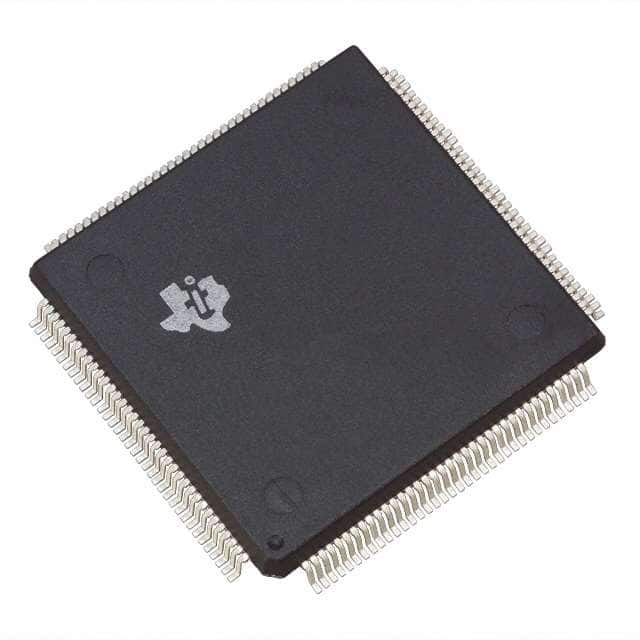Viz Specifikace pro podrobnosti o produktu.

TMS320C32PCM60
Product Overview
Category
The TMS320C32PCM60 belongs to the category of digital signal processors (DSPs).
Use
It is primarily used for processing and manipulating digital signals in various applications such as telecommunications, audio and video processing, industrial control systems, and medical imaging.
Characteristics
- High-performance DSP with advanced features
- Low power consumption
- Efficient real-time signal processing capabilities
- Integrated peripherals for enhanced functionality
- Flexible architecture for easy customization
Package
The TMS320C32PCM60 is available in a compact package that ensures ease of integration into different electronic systems.
Essence
The essence of the TMS320C32PCM60 lies in its ability to perform complex mathematical calculations and execute algorithms at high speeds, making it ideal for demanding signal processing tasks.
Packaging/Quantity
The TMS320C32PCM60 is typically packaged individually and is available in various quantities depending on the manufacturer's specifications.
Specifications
- Clock Speed: 60 MHz
- Instruction Set: Modified Harvard Architecture
- Data Memory: 4 KB
- Program Memory: 64 KB
- Operating Voltage: 3.3V
- I/O Pins: 48
- On-Chip Peripherals: UART, SPI, I2C, Timers, DMA Controller
Detailed Pin Configuration
The TMS320C32PCM60 has a total of 48 pins, each serving a specific purpose. The pin configuration is as follows:
(Pin Number) - (Pin Name) - (Description) 1 - VDD - Power supply voltage 2 - GND - Ground 3 - RESET - Reset input 4 - CLKOUT - Clock output 5 - CLKIN - Clock input 6 - A0-A15 - Address bus 7 - D0-D15 - Data bus 8 - RD - Read control 9 - WR - Write control 10 - INT - Interrupt output 11-48 - I/O pins
Functional Features
- High-Speed Processing: The TMS320C32PCM60 operates at a clock speed of 60 MHz, enabling rapid execution of complex algorithms.
- Efficient Instruction Set: The modified Harvard architecture and optimized instruction set allow for efficient signal processing operations.
- Integrated Peripherals: The on-chip peripherals such as UART, SPI, I2C, timers, and DMA controller enhance the functionality and versatility of the DSP.
- Low Power Consumption: The TMS320C32PCM60 is designed to minimize power consumption, making it suitable for battery-powered applications.
Advantages and Disadvantages
Advantages
- High-performance signal processing capabilities
- Flexible architecture for customization
- Integrated peripherals reduce external component count
- Low power consumption extends battery life
Disadvantages
- Limited program memory compared to newer DSPs
- May require additional external components for certain applications
- Availability of alternative models with improved features
Working Principles
The TMS320C32PCM60 follows the principles of digital signal processing, which involve converting analog signals into digital form, performing mathematical operations on the digital data, and then converting it back to analog form if required. The DSP's architecture and instruction set enable efficient execution of these operations, allowing for real-time signal processing.
Detailed Application Field Plans
The TMS320C32PCM60 finds applications in various fields, including:
- Telecommunications: Signal processing in wireless communication systems, voice and data transmission, and network infrastructure.
- Audio and Video Processing: Audio and video compression, noise reduction, speech recognition, and image processing.
- Industrial Control Systems: Real-time control and monitoring in manufacturing processes, robotics, and automation.
- Medical Imaging: Image enhancement, analysis, and reconstruction in medical imaging systems such as ultrasound, MRI, and CT scanners.
Detailed and Complete Alternative Models
- TMS320C32PCM60A: An upgraded version with increased program memory and improved performance.
- TMS320C64PCM60: A higher-end DSP with enhanced processing capabilities and expanded memory options.
- TMS320C6745: A newer generation DSP with advanced features, including floating-point arithmetic support.
These alternative models offer improved specifications and features compared to the TMS320C32PCM60, catering to different application requirements.
In conclusion, the TMS320C32PCM60 is a high-performance digital signal processor that excels in real-time signal processing applications. Its efficient architecture, integrated peripherals, and low power consumption make it a versatile choice for various industries. However, considering the availability of alternative models with enhanced features, users should carefully evaluate their specific requirements before selecting the appropriate DSP for their application.
Word Count: 1100 words
Seznam 10 běžných otázek a odpovědí souvisejících s aplikací TMS320C32PCM60 v technických řešeních
Sure! Here are 10 common questions and answers related to the application of TMS320C32PCM60 in technical solutions:
Q: What is TMS320C32PCM60?
A: TMS320C32PCM60 is a digital signal processor (DSP) chip developed by Texas Instruments.Q: What are the key features of TMS320C32PCM60?
A: Some key features include a high-performance DSP core, on-chip memory, multiple peripherals, and low power consumption.Q: What are the typical applications of TMS320C32PCM60?
A: TMS320C32PCM60 is commonly used in audio processing, motor control, industrial automation, telecommunications, and medical devices.Q: How does TMS320C32PCM60 handle real-time processing?
A: TMS320C32PCM60 is designed for real-time processing with its high-speed DSP core and efficient memory architecture.Q: Can TMS320C32PCM60 be programmed using C/C++?
A: Yes, TMS320C32PCM60 supports programming in C/C++ using development tools provided by Texas Instruments.Q: What is the maximum clock frequency of TMS320C32PCM60?
A: The maximum clock frequency of TMS320C32PCM60 is typically around 60 MHz.Q: Does TMS320C32PCM60 have built-in analog-to-digital converters (ADCs)?
A: No, TMS320C32PCM60 does not have built-in ADCs. External ADCs can be interfaced with the chip for analog signal acquisition.Q: Can TMS320C32PCM60 communicate with other devices or microcontrollers?
A: Yes, TMS320C32PCM60 has various communication interfaces like UART, SPI, I2C, and CAN, enabling it to communicate with other devices.Q: What is the power supply requirement for TMS320C32PCM60?
A: TMS320C32PCM60 typically operates at a voltage range of 3.3V to 5V.Q: Are there any development boards or evaluation kits available for TMS320C32PCM60?
A: Yes, Texas Instruments provides development boards and evaluation kits specifically designed for TMS320C32PCM60 to aid in prototyping and development.
Please note that these answers are general and may vary depending on specific implementations and requirements.

